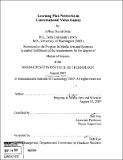Learning plan networks in conversational video games
Author(s)
Orkin, Jeffrey David
DownloadFull printable version (19.11Mb)
Other Contributors
Massachusetts Institute of Technology. Dept. of Architecture. Program in Media Arts and Sciences.
Advisor
Deb Roy.
Terms of use
Metadata
Show full item recordAbstract
We look forward to a future where robots collaborate with humans in the home and workplace, and virtual agents collaborate with humans in games and training simulations. A representation of common ground for everyday scenarios is essential for these agents if they are to be effective collaborators and communicators. Effective collaborators can infer a partner's goals and predict future actions. Effective communicators can infer the meaning of utterances based on semantic context. This thesis introduces a computational cognitive model of common ground called a Plan Network. A Plan Network is a statistical model that provides representations of social roles, object affordances, and expected patterns of behavior and language. I describe a methodology for unsupervised learning of a Plan Network using a multiplayer video game, visualization of this network, and evaluation of the learned model with respect to human judgment of typical behavior. Specifically, I describe learning the Restaurant Plan Network from data collected from over 5,000 players of an online game called The Restaurant Game.
Description
Thesis (S.M.)--Massachusetts Institute of Technology, School of Architecture and Planning, Program in Media Arts and Sciences, 2007. Includes bibliographical references (p. 121-123).
Date issued
2007Department
Program in Media Arts and Sciences (Massachusetts Institute of Technology)Publisher
Massachusetts Institute of Technology
Keywords
Architecture. Program in Media Arts and Sciences.